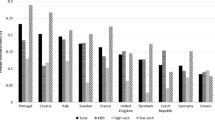Abstract
In this paper, we estimate the production function of new Japanese firms and examine whether the total factor productivity is affected by the human capital and gender of entrepreneurs. Empirical results show decreasing returns to scale of production, which verifies the assumption of production functions in many previous studies on entrepreneurship. Further, it is shown that the entrepreneur's age has a significantly negative effect on productivity, and the negative effect increases after 60 years of age. Although related business experience before startup has a significantly positive effect, the magnitude is limited and cannot overcome the negative effect of age. The results indicate the importance of starting up while young, at the latest, before 60 years of age.
Similar content being viewed by others
References
Audretsch, David B., Luuk Klomp, and A. Roy Thurik, 1997, 'Do Service Differ From Manufacturing? The Post-Entry Performance of Firms in Dutch Services', CEPR Discussion Paper 1718.
Beckman, Martin J., 1977, 'Management Production Functions and the Theory of the Firm', Journal of Economic Theory 14(1), 1–18.
Coe, David T. and Elhanan Helpman, 1995, 'International R&D Spillovers', European Economic Review 39(5), 859–887.
Copeland, Morris A., 1937, 'Concepts of National Income', in Studies in Income and Wealth, Vol. 1, New York: NBER, pp. 3–63.
Cressy, Robert, 1996, 'Are Business Startups Debt-Rationed?', Economic Journal 106, 1253–1270.
Dunn, Thomas and Douglas Holtz-Eakin, 2000, 'Financial Capital, Human Capital, and the Transition to Self-Employment: Evidence from Intergenerational Links', Journal of Labor Economics 18(2), 282–305.
Evans, David S. and Boyan Jovanovic, 1989, 'An Estimated Model of Entrepreneurial Choice under Liquidity Constraints', Journal of Political Economy 97(4), 808–827.
Evans, David S. and Linda S. Leighton, 1989, 'Some Empirical Aspects of Entrepreneurship', American Economic Review 79(3), 519–535.
Gentry, William M. and R. Glenn Hubbard, 2000a, 'Tax Policy and Entrepreneurial Entry', American Economic Review 90(2), 283–287.
Gentry, William M. and R. Glenn Hubbard, 2000b, 'Entrepreneurship and Household Saving', NBER Working Paper 7894
Griliches, Zvi, 1996, 'The Discovery of the Residual: A Historical Note', Journal of Economic Literature 34, 1324-1330.
Griliches, Zvi and Jacques Mairesse, 1995, 'Production Functions: the Search for Identification', NBER Working Paper 5067.
Harada, Nobuyuki, 2002, 'Who Succeeds as an Entrepreneur? An Analysis of the Post-Entry Performance of New Firms in Japan', Japan and the World Economy, forthcoming.
Hamilton, Barton, H., 2000, 'Does Entrepreneurship Pay? An Empirical Analysis of the Returns to Self-Employment', Journal of Political Economy 108(3), 604–631.
Hoch, Irving, 1955, 'Estimation of Production Function Parameters and Testing for Efficiency', Econometrica 23(3), 325–326.
Hoch, Irving, 1962, 'Estimation of Production Function Parameters Combining Time-Series and Cross-Section Data', Econometrica 30(1), 34–53.
Honjo, Yuji, 2001, 'Growth of Start-up Firms: Evidence from the Japanese Manufacturing Industry', Institute of Business Research, Chuo University, Working Paper.
Holtz-Eakin, Douglas, David Joulfaian and Harvey S. Rosen, 1994, 'Sticking It Out: Entrepreneurial Survival and Liquidity Constraints', Journal of Political Economy 102(1), 53–75.
Hulten, Charles R., 2000, 'Total Factor Productivity: A Short Biography', NBER Working Paper 74
Kuroda, Masahiro and Koji Nomura, 1999, 'An Explanation of the Productivity Paradox: TFP Spillover through Capital Accumulation', Bank of Japan, IMES Discussion Paper 99-E-10.
Lichtenberg, Frank R., 1992, Corporate Takeovers and Productivity, Cambridge and London: MIT Press.
Lichtenberg, Frank R. and George M. Pushner, 1994, 'Ownership Structure and Corporate Performance in Japan', Japan and the World Economy 6(3), 239–261.
Lucas, Robert E., Jr., 1978, 'On the Size Distribution of Business Firms', Bell Journal of Economics 9(2), 508–523.
Miyagawa, Tsutomu, Yukiko Ito, and Nobuyuki Harada, 2002, 'Does IT Revolution Contribute to Japanese Economic Growth?', Japan Center for Economic Research Discussion Paper 75.
Palia, Darius and Frank R. Lichtenberg, 1999, 'Managerial Ownership and Firm Performance: A Re-Examination Using Productivity Measurement', Journal of Corporate Finance 5(4), 323–339.
Rosen, Sherwin, 1982, 'Authority, Control, and the Distribution of Earnings', Bell Journal of Economics 13(2), 311–323.
Solow, Robert, 1957, 'Technical Change and the Aggregate Production Function', Review of Economics and Statistics 39(3), 312–320.
Sonobe, Tetsushi and Keijiro Otsuka, 2001, 'A New Decomposition Approach to Growth Accounting: Derivation of the Formula and its Application to Prewar Japan', Japan and the World Economy 13(1), 1–14.
Tinbergen, Jan, 1942, 'Zur Theorie der Langfirstigen Wirtschaftsentwicklung', Weltwirts Archiv 1, Amsterdam: North-Holland, pp. 511–549; reprinted in English translation in Jan Tinbergen, 1959, Selected Papers, North-Holland, pp. 182-221.
Urata, Shujiro and Hiroki Kawai, 2002, 'Technological Progress by Small and Medium Enterprises in Japan', Small Business Economics 18(1-3), 53–67.
Zellner, Arnold, Jan Kmenta and Jacques Dreze, 1966, 'Specification and Estimation of Cobb-Douglas Production Function Models', Econometrica 34(4), 784–795.
Author information
Authors and Affiliations
Rights and permissions
About this article
Cite this article
Harada, N. Productivity and Entrepreneurial Chraracteristics in New Japanese Firms. Small Business Economics 23, 299–310 (2004). https://doi.org/10.1023/B:SBEJ.0000032038.32318.62
Issue Date:
DOI: https://doi.org/10.1023/B:SBEJ.0000032038.32318.62




